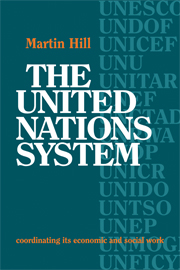Book contents
- Frontmatter
- Contents
- Foreword
- Preface
- Introduction
- Part I The problem of coordination and its setting
- 1 Relationship problems inherent in the decentralized United Nations System
- 2 Developments that have affected inter-agency relationships and coordination
- 3 The content of coordination activities
- 4 Intergovernmental organs responsible for coordination
- 5 The Administrative Committee on Coordination
- 6 The Secretary-General and the secretariats of the United Nations and the agencies
- 7 Some current constraints on order and coordination in the system
- Part II Some conclusions and suggestions
- Postscript
- 1 Abbreviations and glossary of institutions
- 2 Principal organs of the United Nations (General Assembly, Economic and Social Council and Secretariat) with main subsidiary organs directly concerned with economic and social cooperation and coordination (Status as of Spring 1976)
- 3 Chart of agencies related to the United Nations
- 4 Regional and branch offices of organizations of the United Nations System
- 5 Chart of the United Nations System
- 6 A new UN structure for global economic cooperation–list of conclusions and recommendations of the Group of Experts, prepared by the Secretariat
- Notes
- Index
1 - Relationship problems inherent in the decentralized United Nations System
Published online by Cambridge University Press: 05 November 2011
- Frontmatter
- Contents
- Foreword
- Preface
- Introduction
- Part I The problem of coordination and its setting
- 1 Relationship problems inherent in the decentralized United Nations System
- 2 Developments that have affected inter-agency relationships and coordination
- 3 The content of coordination activities
- 4 Intergovernmental organs responsible for coordination
- 5 The Administrative Committee on Coordination
- 6 The Secretary-General and the secretariats of the United Nations and the agencies
- 7 Some current constraints on order and coordination in the system
- Part II Some conclusions and suggestions
- Postscript
- 1 Abbreviations and glossary of institutions
- 2 Principal organs of the United Nations (General Assembly, Economic and Social Council and Secretariat) with main subsidiary organs directly concerned with economic and social cooperation and coordination (Status as of Spring 1976)
- 3 Chart of agencies related to the United Nations
- 4 Regional and branch offices of organizations of the United Nations System
- 5 Chart of the United Nations System
- 6 A new UN structure for global economic cooperation–list of conclusions and recommendations of the Group of Experts, prepared by the Secretariat
- Notes
- Index
Summary
The organizational structure of the League of Nations' non-political work–on economic and financial matters, on communications and transit, on health, on narcotic drug control and certain other social problems–was essentially a centralized one, although each technical ‘organization’ enjoyed a considerable degree of independence. The Expert Committees in each organization reported to the League of Nations Council and were served by members of the League secretariat; and the work was financed from the budget of the League. That budget also financed the work of the International Labour Organization (ILO), which had been established, in accordance with Chapter 13 of the Treaty of Versailles, ‘at the seat of the League of Nations as part of the organisation of the League’.
The proposals made in August 1939 by the Special Committee of the League of Nations on the Development of International Co-operation in Economic and Social Affairs (the Bruce Committee) would have replaced in this field the League Council–a body consisting largely of Ministers for Foreign Affairs and concerned primarily with political issues–by a Central Committee for Economic and Social Questions, composed in large part of ministers and high officials directly involved in such questions and in which non-Members of the League could participate on a basis of equality with Members. The Central Committee was to exercise, as the League Council had done, ‘direction and control’ over all the League's economic and social activities.
- Type
- Chapter
- Information
- The United Nations SystemCoordinating its Economic and Social Work, pp. 11 - 23Publisher: Cambridge University PressPrint publication year: 1978



